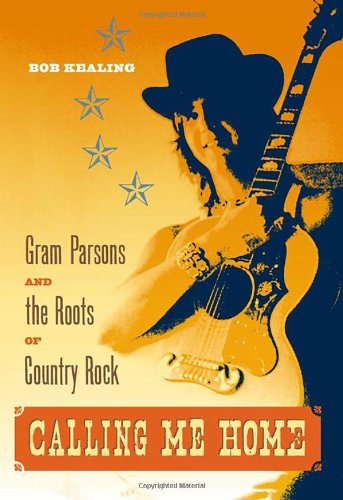Selected as one of the best books of the year by:
Uprooted Music Revue
Engine 145
Uncut
“Calling Me Home: is about just that: a land that always beckons, that underlies most of Gram’s songwriting, . . . a land that informs not only him but all others with whom he associated and learned from him.â€â€”Gram InterNational
“Takes the reader from the present to the past and back again, conveying a vivid document of Gram Parsons’s life and career, as well as those who played essential roles in the country-rock pioneer’s journey. There are lots of surprises along the way.â€â€”Holly George-Warren, author of Public Cowboy No. 1: The Life and Times of Gene Autry
 “Has a great narrative velocity. Even though we know how this story is going to end—tragically, of course—Kealing keeps us turning the page as we follow Gram Parsons through his short, rich life.â€â€”William McKeen, author of Outlaw Journalist: The Life and Times of Hunter S. Thompson
 “I could almost hear the music coming from those now-dilapidated buildings where Gram Parsons received his musical education. Bob Kealing makes them come alive as he explores the faces and places that turned Parsons from a southern-bred trust fund child into a self-destructive yet visionary musical pioneer.â€â€”Jeffrey M. Lemlich, author of Savage Lost: Florida Garage Bands: The ’60s and Beyond
On September 19, 1973, Gram Parsons became yet another rock-and-roll casualty in an era of excess, a time when young men wore their dangerous habits like badges of honor. Unfortunately, his many musical accomplishments have been overshadowed by a morbid fascination with his drug overdose in the Joshua Tree Inn at the age of twenty-six and the failed attempt to steal his body and burn it in the desert—but not in this literary journey.
Known as the father of country rock, Parsons played with the International Submarine Band, The Byrds, and the Flying Burrito Brothers. In the late 1960s and early ’70s, he was a key confidante of Keith Richards. In 1972, he gave his musical soul mate, Emmylou Harris, her first big break. When Tom Petty re-formed his Florida garage band Mudcrutch, he invoked the name of Gram Parsons as an inspiration. Musicians as diverse as Elvis Costello, Dwight Yoakam, Ryan Adams, Patty Griffin, and Steve Earle have also paid homage to alt-country’s patron saint. In the decades after his death, tribute albums, concerts, and biographies have legitimized the role Parsons played in the evolution of modern music and freed his legacy from that half-charred coffin abandoned in the desert.
In Calling Me Home, Kealing traces the entire arc of Parsons’s career, emphasizing his southern roots. Drawing on dozens of new interviews as well as unpublished letters and photographs provided by Parsons’s family and rare images from legendary photojournalist Ted Polumbaum, Kealing examines the remarkable array of musicians and friends with whom Parsons collaborated and from whom he gained inspiration. Through his tireless efforts, Kealing has uncovered facts that even the most stalwart Parsons fans will find new and revealing.
Starting in Waycross, Georgia, Parsons’s boyhood home, Kealing traces Parsons’s journey through both famous venues and out-of-the-way dives. From the overlooked teen youth centers of Orlando and central Florida, to the southern folk mecca of Coconut Grove, Florida, and from the birthplace of outlaw country in Austin, Texas, to the Ryman Auditorium in Nashville, Tennessee, Kealing celebrates Parsons’s timeless and transformative musical legacy—a legacy that’s still alive among the swamps, palmettos, cypress knees, and Spanish moss of the American South.















